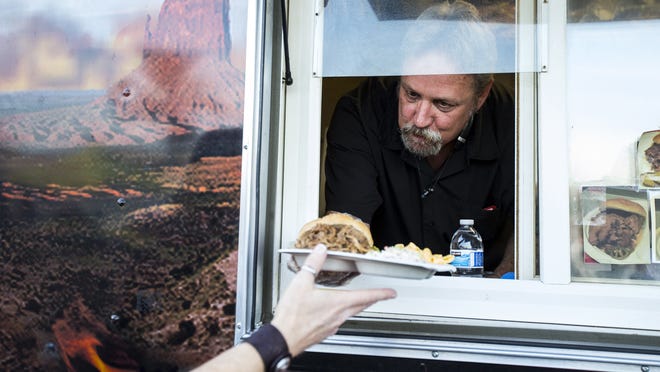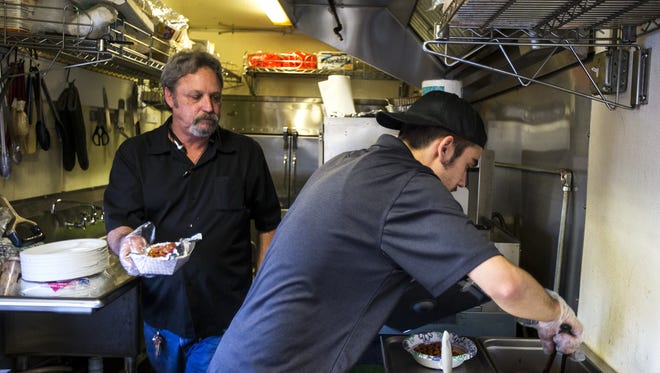Lawmaker who wants to loosen rules for food trucks owns a food truck
 Dustin Gardiner
Dustin Gardiner

More food trucks could soon pop up on street corners and other public spaces popular with pedestrians in Arizona.
State Rep. Kevin Payne, R-Peoria, has proposed a law that would cut local government regulations that food-truck operators say hamper business. They complain such rules keep them out of many areas, such as parks and public parking lots.
Payne's proposal, House Bill 2371, would curtail many city and county ordinances that limit where food trucks can park and what hours they can serve customers.
His interest in the issue is personal: Payne owns a food truck. He said attorneys for the House determined it was not a conflict of interest for him to sponsor HB 2371.
The bill comes as cities in Arizona and across the country have struggled to regulate the food-truck industry, which has boomed since the late 2000s. That popularity has raised issues about parking, hours of operation and distance from brick-and-mortar restaurants.
Initially, Payne's bill drew loud protests from the League of Arizona Cities and Towns. But that opposition has subsided after Payne accepted an amendment to limit some of the bill’s reach.
A panel in the state House of Representatives voted 7-2 to advance the bill on Feb. 12, and it now heads to the full House for a vote.
Payne: Trucks face hurdles with cities
Payne said the impetus for the bill started with his love of smoked barbecue.
In 2015, Payne and his wife bought a food truck after friends at an Arizona Cardinals tailgating party raved about his barbecue. He used his savings to build a custom truck, and K Star BBQ was born.
But Payne said he quickly learned how hard it is to do business given the patchwork of regulations in different cities.
He said some cities don't allow food trucks to operate after 9 p.m. Others prohibit trucks in upscale areas. A few localities even require his food truck to have a certain size of trash can.
Payne said that's why, when he became a state lawmaker last year, he started working to deregulate food trucks. He said the bill would treat food trucks the same as other commercial vehicles, so cities can't create special requirements to keep them out of public spaces.
The bill would also let them operate during the same hours as restaurants, he said.
“I just want an even playing field,” Payne said. “We’re trying to make a living and we shouldn’t have to jump through all these hoops to do it.”

Ken Strobeck, executive director of the League of Arizona Cities and Towns, said local governments initially opposed the bill because they feared it would give food-truck owners special privileges that other businesses don’t have.
Among other concerns, cities worried the bill would allow food-truck owners to park in any public place, such as a park or metered parking space, without limits.
But Strobeck said Payne was willing to listen and made most of the amendments they sought.
The amended bill allows cities, towns and counties to prohibit food trucks from blocking traffic. Municipalities and counties also can impose spacing requirements from other buildings, including restaurants, for public-safety purposes.
The Arizona Restaurant Association is neutral on the bill; its lobbyist said the association has no objections to the bill after it was amended.
Strobeck said the league also understands food-truck operators’ concerns about the need for more consistency in regulations.
The bill also creates a statewide food-truck license, so vendors don't have to try to comply with a patchwork of different health and safety regulations from county to county.
Two lawmakers — Richard Andrade, D-Glendale; and Rep. Diego Espinoza, D-Tolleson — voted against the bill when it was before the House’s regulatory-affairs committee this week.
Both said they have concerns about the impact on local governments but might support it later with more changes.

Does Payne have a conflict of interest?
Opponents of the bill have also questioned if Payne has a conflict of interest given he owns a food truck.
Payne said before he introduced the bill, he consulted with House attorneys about the question of whether he has a conflict. He said they told him there's no legal conflict because many owners would benefit.
“I wanted to make sure it wasn’t perceived as a conflict,” Payne said. “I do worry about that. (But) I’m not doing anything that’s going to benefit me anymore than the thousand other food trucks that are here.”
Strobeck, who initially voiced concerns about Payne's stake in the bill, said he feels better about the issue given Payne disclosed his ownership when he testified before the House committee.
“It’s more like an industry bill than a single owner’s bill,” Strobeck added.
According to Arizona law, legislators do not have to declare a conflict of interest and refrain from taking action on a bill if at least nine other people would benefit from it in a similar way.
OTHER LEGISLATIVE NEWS:
Yuma County farmer picked to replace Don Shooter in Arizona House
Arizona Legislature casts first vote to extend $643M education sales tax
Bill would speed up adoptions, cut off parents